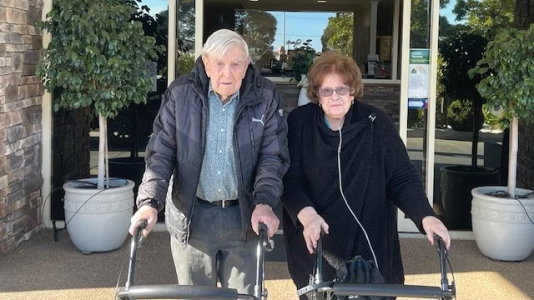Volunteer community transport cuts back social outings for aged care clients
By
ABC News
- Replies 0
A volunteer transport service in Victoria's north-west says it has been forced to cut its offerings in the lead-up to the federal government's aged care reforms.
For more than four decades, SunAssist Volunteer Helpers has driven clients in the town of Mildura and south-west NSW communities to medical appointments, supermarkets, and social outings.
But from this month, the charity will no longer offer transport for social outings for its isolated older clients due to what it says are increasing administrative costs from the federal government's aged care reforms, due to come into place in November.
SunAssist chief executive Richard Garlick said it was not an easy decision.
"Having to cut back on services is a really difficult thing, but we have no other choice," Mr Garlick said.
"We have to remain sustainable for our existing clients, and for the 70-odd new clients we get referred to us every month."
The charity offers more than 180 trips every day for its clients, and relies on a fleet of volunteer drivers.
Mr Garlick said SunAssist was only funded by the federal government to deliver 54 trips per day, and subsidised the remaining trips through philanthropy.
He said the pressures of new client referrals and new aged care compliance measures left the organisation no choice but to limit its offerings to essential travel.
He said since entering residential care, Ms O'Donnell would routinely go to the hairdresser twice during the working week as her only independent social outing.
Ms O'Donnell would use SunAssist, costing about $20 per return trip from an aged care facility in Mildura, rather than between $80 and $100 for a taxi.
"Certainly, for mum and dad and a lot of elderly people, their world becomes smaller [when they enter residential care], and the little things become more important to them," Mr O'Donnell said.
"For mum, having her hair done nicely every week is something she really looks forward to, and gets a lot of benefit out of emotionally.
"We certainly get mum and dad out on the weekends and other times for family functions, but this is her one independent moment for the week and creates a bit of normality for her life."
Mr O'Donnell said his mother had now cut down her hairdresser appointments to budget for the higher travel cost.
Rural Care Australia Limited chief executive Gerard Jose said almost half of the residents at an aged care facility he supervised used SunAssist's community transport option on a "fairly regular" basis.
"For some it's their only means of connecting and engaging with outside social support," Mr Jose said.
"If you looked at the 60-odd regional cities across Australia, they'd all be facing similar challenges in both community transport and specialised transport that supports people who might have special needs within aged care or even home care.
"Community transport is an essential part of social connectedness and without it people are diminished socially, emotionally and financially."
"There's a huge variety of things like distance and client need that should be influencing that price," Mr Coates said.
A Department for Health, Disability and Ageing spokesperson said all Commonwealth Home Support Program (CHSP) providers were expected to sustainably manage their funding and services as part of their grant agreement.
The department is also offering an Emergency and Critical Need Grant Opportunity for any providers with ongoing viability concerns.
"This grant opportunity is designed to provide financial support to CHSP providers facing unforeseen and exceptional circumstances and is available until 30 April, 2027," the spokesperson said.
"CHSP transport providers can also apply through this grant for additional one-off funding for assistance with increased fuel costs."
The aged care sector is in the middle of a transition, after the Aged Care Act was revised in 2024 following a royal commission.
Mr Garlick said that as a result, providers were facing increased administrative costs to meet more intensive compliance requirements in the aged care sector, including additional recruitment, training, insurance, and vetting of volunteers.
"Compliance is becoming more of an issue for us all, and how to meet those compliance requirements is becoming increasingly difficult," Mr Garlick said.
"As a service provider ourselves, we're really struggling to make sure that we're compliant in every area of the aged care standards.
"We struggle to meet all of our compliance issues as well as providing well above our funded target in all our service areas, so we have to take on additional contracts just to meet the community's requirements."
Mr Coates said providers, including community transport services, needed to be supported through the changes.
"We're really at a tipping point now where this could either be the best thing that's happened to people in aged care or it could be the worst thing that has happened to them," he said.
"It's all in the implementation."
By Wade Stephens
For more than four decades, SunAssist Volunteer Helpers has driven clients in the town of Mildura and south-west NSW communities to medical appointments, supermarkets, and social outings.
But from this month, the charity will no longer offer transport for social outings for its isolated older clients due to what it says are increasing administrative costs from the federal government's aged care reforms, due to come into place in November.
SunAssist chief executive Richard Garlick said it was not an easy decision.
"Having to cut back on services is a really difficult thing, but we have no other choice," Mr Garlick said.
"We have to remain sustainable for our existing clients, and for the 70-odd new clients we get referred to us every month."
The charity offers more than 180 trips every day for its clients, and relies on a fleet of volunteer drivers.
Mr Garlick said SunAssist was only funded by the federal government to deliver 54 trips per day, and subsidised the remaining trips through philanthropy.
He said the pressures of new client referrals and new aged care compliance measures left the organisation no choice but to limit its offerings to essential travel.
Commutes to tackle isolation no longer supported
The effect of the service change was immediately noticed by Peter O'Donnell, whose mother, Anne O'Donnell, entered a nursing home about 18 months ago.He said since entering residential care, Ms O'Donnell would routinely go to the hairdresser twice during the working week as her only independent social outing.
Ms O'Donnell would use SunAssist, costing about $20 per return trip from an aged care facility in Mildura, rather than between $80 and $100 for a taxi.
"Certainly, for mum and dad and a lot of elderly people, their world becomes smaller [when they enter residential care], and the little things become more important to them," Mr O'Donnell said.
"For mum, having her hair done nicely every week is something she really looks forward to, and gets a lot of benefit out of emotionally.
"We certainly get mum and dad out on the weekends and other times for family functions, but this is her one independent moment for the week and creates a bit of normality for her life."
Rural Care Australia Limited chief executive Gerard Jose said almost half of the residents at an aged care facility he supervised used SunAssist's community transport option on a "fairly regular" basis.
"For some it's their only means of connecting and engaging with outside social support," Mr Jose said.
"If you looked at the 60-odd regional cities across Australia, they'd all be facing similar challenges in both community transport and specialised transport that supports people who might have special needs within aged care or even home care.
"Community transport is an essential part of social connectedness and without it people are diminished socially, emotionally and financially."
Funding structures put into question
Australian Community Transport Association chief executive Murray Coates said the federal government capped the number of services it funded each provider to offer, and the reimbursement failed to account for different distances and purposes of trips."There's a huge variety of things like distance and client need that should be influencing that price," Mr Coates said.
A Department for Health, Disability and Ageing spokesperson said all Commonwealth Home Support Program (CHSP) providers were expected to sustainably manage their funding and services as part of their grant agreement.
The department is also offering an Emergency and Critical Need Grant Opportunity for any providers with ongoing viability concerns.
"This grant opportunity is designed to provide financial support to CHSP providers facing unforeseen and exceptional circumstances and is available until 30 April, 2027," the spokesperson said.
"CHSP transport providers can also apply through this grant for additional one-off funding for assistance with increased fuel costs."
Mr Garlick said that as a result, providers were facing increased administrative costs to meet more intensive compliance requirements in the aged care sector, including additional recruitment, training, insurance, and vetting of volunteers.
"Compliance is becoming more of an issue for us all, and how to meet those compliance requirements is becoming increasingly difficult," Mr Garlick said.
"As a service provider ourselves, we're really struggling to make sure that we're compliant in every area of the aged care standards.
"We struggle to meet all of our compliance issues as well as providing well above our funded target in all our service areas, so we have to take on additional contracts just to meet the community's requirements."
Mr Coates said providers, including community transport services, needed to be supported through the changes.
"We're really at a tipping point now where this could either be the best thing that's happened to people in aged care or it could be the worst thing that has happened to them," he said.
"It's all in the implementation."
By Wade Stephens










